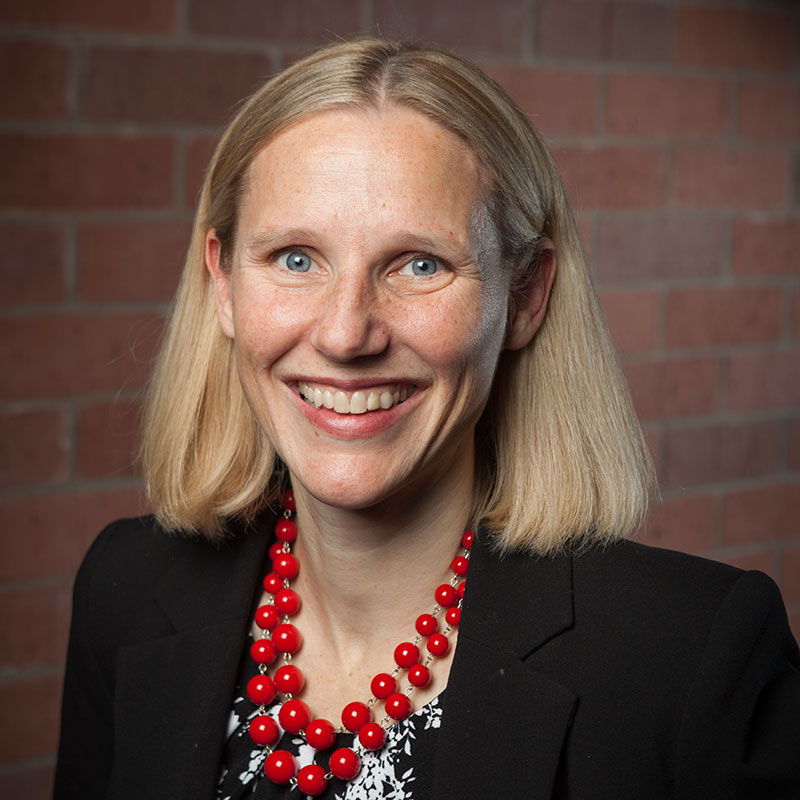Contributing Assistant Professor Marianne Bradshaw unifies experiential learning with community service.
“It’s not enough to know how to conduct strong market research; you have to understand why you’re doing it. What are the objectives of the research? How will the research impact decisions? What data will help guide that action?”
Meet Marianne Bradshaw, the adjunct professor who leads Willamette’s elective course “Research for Marketing Decisions.” She’s summarizing knowledge gained from her 10+ years conducting market research in the private and nonprofit sectors.
Sharing A Career’s Worth Of Knowledge
“It’s not a linear process, where you pass through the steps, and come out at the end with the answers,” she explains. “First, you may not even know the questions that you should be asking. Even then, preliminary research may shift the initial reasons for the research, forcing you back to the drawing board. Marketing isn’t black and white. It all depends on the data, on the decision in question, the timeline, the stakes, the budget, etc.”
Mrs. Bradshaw speaks from experience. After earning her MBA, she began working as a marketing research manager for Procter & Gamble. She spent several years in the pharmaceutical division, leading a wide range of primary research studies on the patient experience. Later she transferred into P&G’s corporate side where she had global responsibilities for curriculum design and trainer development.
Pairing Student Energy With Local Need
For Bradshaw’s first two semesters teaching “Research for Marketing Decisions,” she acted as the client for her student groups, and assigned hypothetical business questions. After a student bemoaned the fact that her group’s efforts weren’t serving anyone directly, Bradshaw recruited local organizations with real business questions. (In fact, she continues to seek local organizations that want help from her class.*)
This August, four Salem-area clients -Salem Saturday Market, Courthouse Fitness, Salem Health, and Cascade Football Club- met with their student groups on the first day of class, shared their marketing questions, and set up a schedule for their engagement over the course of the semester.
“Now, the format is highly experiential, from start to finish,” explains Bradshaw. “Students see how the marketing research framework is very process-oriented, very iterative, and very interactive. Our in-class discussions, the reading, and all of their class time are geared to serving their clients’ needs. That real-world experience makes for a great addition to students’ resumes and a talking point during interviews.”
Each group’s research occurs in two phases. First, there’s an exploratory investigation, then a descriptive survey. Why exploratory first? “Frequently, businesses deploy surveys without knowing which questions to ask. Or they may use language that’s vague or company-centric. That yields confusing results,” Bradshaw explains. “By starting with an exploratory phase, students get up to speed on their clients’ needs, and articulate their questions for the second, descriptive phase.” At the end of the term, teams will present their findings and recommendations at their respective clients’ offices.
Clients may change their business questions, forcing students to reformulate their approach. “That’s just the way it is in the real world,” Bradshaw shrugs. “Sometimes, you don’t know the right questions until after you’ve begun the research.”
What Are The Student Groups Doing For Their Clients?
Courthouse Fitness, the only for-profit client, wants to know how to increase memberships and member satisfaction. To begin, Courthouse gave its student group two-week passes for some first-hand experience. Students also conducted brief, informal interviews with current members in the club’s lobby. The results of that exploration will inform a new-customer survey.
Colleen Smith MBA’14, on the Courthouse team, praises the experience: “I took this class because I want to pursue a career in marketing. The more I learn, the more I see that good marketing communications depends on good market research. I’m surprised by how deep you can go, and how much of a science it really is.”
Tayseer Gherfal MBA’14, a student from Libya working on the Salem Saturday Market team, concurs: “I was already interested in the class before I understood its experiential core. The experience-based approach attracted me all the more. I’m taking this class because there isn’t much market research in my home country. When I return to start my own business, I’ll need to do the market research for myself.”
Gherfal’s team is helping the Salem Saturday Market decide whether to operate year-round. His group conducted a simple, effective dot survey asking market-goers three questions: “Would you want a winter market?” “How frequently would you come?” and “What would you want to buy?” Approximately 300 people engaged the students. With this preliminary public interest, the student group will design a survey for the market’s 230 vendors to find out if they would be interested in participating, and what concerns they may have about such a change.
In early December, each student team will present their findings and recommendations at their clients’ locations. “I want to make it easy for the clients to receive my students’ suggestions,” says Bradshaw. “Research is only as useful as the decision-makers’ confidence in it. By the time my students make their final recommendations, the clients shouldn’t have any doubts about their techniques, and the validity of their data.”
The on-site presentations reflect Bradshaw’s overarching emphasis on experiential learning: “You can read about principles and case studies all day long, but working through the process, dissecting the data, finding the story in the numbers, and bringing a recommendation to a client, well, that’s where the learning happens.”
--
* Would your organization be a good candidate for Marianne Bradshaw’s student teams? Please contact her directly to discuss the possibility.


